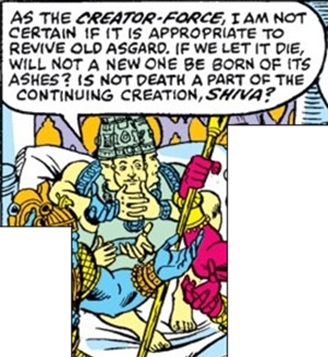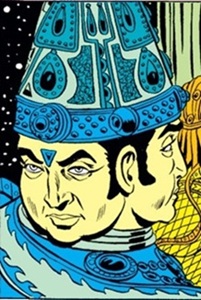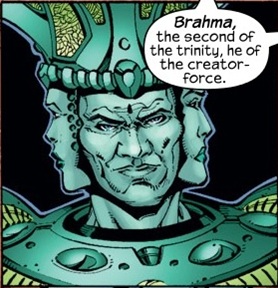
BRAHMA
Real Name: Brahma
Identity/Class: Hindu god
Occupation: God of creation, magic and wisdom
Group Membership: Daevas (Hindu gods), Trimuti (Shiva, Vishnu), Council Elite
Affiliations: Thor Odinson
Enemies: Ravanna, Kubera, the Asuras, the Rakshasas
Known Relatives: Ammavaru (mother), Shiva, Vishnu (brothers), Sata-Rupa (first wife), Manu (son), Sarasvati (second wife), Vach (daughter), Adharma (son), Lakshmi, Parvati, Ganga (sisters-in-law), Ganesha, Skanda, Kama (nephews), Kâli (niece/sister-in-law)
Aliases: The Creator; Vohu Manah (Persian name), Purusha, Prajapati, Kamalasana, Narayana
Base of Operations: Vaikuntha in the dimension of Nirvana
First Appearance: Thor I#301 (November, 1980)

Powers/Abilities: Brahma possesses greater than normal powers than most of the Hindu gods except for Vishnu and Shiva. He has superhuman strength (Class 50 perhaps), stamina and resistance to injury. He has extra-ordinary clairvoyance on a nearly omniscient level as well as the ability to tap into and manipulate mystical and cosmic energies equal to Vishnu, Odin or Zeus. Brahma is also credited with riding Hamsa, a great cosmic goose, across the sky.
Height: Unrevealed
Weight: Unrevealed
Eyes: Unrevealed
Hair: Black
History:
(Hindu Myth) - Brahma is the son of the
ancient Earth goddess Ammavaru; according to ancient myth, she laid the
great egg from which sprang Brahma, Vishnu and Shiva. The three brothers
used the top part of the egg to create the sky and the bottom half
became the earth itself. Brahma was also considered the reincarnation of
their ancient ancestor, Purusha and was known under that name as well as
Prajapati. He was also described as self-existent and the embodiment of
eternity in Hinduism and father of all Brahmans. He fell in love with
the goddess Sata-Rupa and grew up to five faces to look upon her beauty,
but Shiva destroyed one. As the divine god in the Brahman Religion,
Brahma once dared to suggest he was more powerful than Vishnu, but Shiva
appeared to them in such force that they both had to admit his supremacy
over themselves.
Brahma also married the river-goddess Sarasvati; she gave birth to Vach, goddess of speech, and Adharma, god of prayer. Traditionally, in some myths, she is his second wife, but in others, she is the reincarnation of Sata-Rupa.
(Thor I#301) - As part of the divine Trimutri with Vishnu and Shiva, Brahma arbitrated many of their decisions and kept the balance between creation and destruction. When Thor came to Nirvana to petition the life-energies to restore the Asgardians after Ragnarok, they discussed his case and turned down his wish to revive his pantheon. Brahma watched as Shiva and Thor clashed over egos and refused to get involved; but Shiva, sensing how passionate Thor was to his cause, changed his vote and donated the life-energies.

(Thor II#61) - Thor was called before the Council Elite to be tested for worthiness to join them, as a replacement for Odin--Brahma was present at this meeting, in which Thor was judged as having failed the test.
(Thor II#65) - Brahma was present when members of the Council Elite were concerned that Thor's actions on Earth violated the Council's Covenant of Noninterference.
(Secret Warriors I#10) - Brahma was present when Phobos (Alexander Aaron), son of Ares, was found worthy by the Council of Godheads to be a god.
(Heroic Age: Prince of Power#1) - The Council met to discuss who would be the greatest hero of the heroic age. Captain America, Iron Man, and Thor were proposed by some, and Athena told them with certainty that it was Amadeus Cho.
(Heroic Age: Prince of Power#2) - When Vali Halfling of the Pantheon extinguished the Promethean Flame that granted Olympians their immortality, Athena screamed in pain; she was comforted by Izanagi. Threatened by Vali's threat to attain everything he needed to gain full omniscience, all Council members returned to their respective realms.
Comments: Adapted by Mark Gruenwald, Ralph Macchio and Keith Pollard for Thor.
The use of the Hindu gods in Thor I#301 obviously did not sit
well with numerous Hindu-Americans, and the Hindu gods ended up reduced to
occasional cameo roles in the Marvel Universe to prevent further offense.
A similar controversy occurred when Rama appeared in Wonder Woman
II#148-150. Likewise, during the Legendary Journeys of the TV series Xena,
the more obscure entity of Azhi Dahak was used over a recognizable Hindu
demon as Ravanna (Persian: Ahriman).
As a result of the uproar of Thor's defeat of Shiva, Indra
appeared in Thor Annual#10, and claimed that it was he who had fought
Thor in Thor#301, not Shiva.
See the comments on Shiva for Pranshu B. Saxena's take on these events.
Ammavaru is an ancient Dravidian earth-goddess comparable to the Olympian Rhea. In Vedic myth, she has been described as the mother of Vishnu, Brahma and Shiva.
In Balinese Hinduism, Brahma, Vishnu and Shiva were three aspects of one god named Sang Hyang Wasa, a being so great he could not attain a human form.
New and additional images by Ron Fredricks.
Profile by Will Uchtman. Updates by Markus Raymond & Ron Fredricks.
CLARIFICATIONS:
Brahma has no known connections (other than serving as the namesake) to:
images: (without ads)
Thor I#301, p15, pan2 (main image - Brahma)
Thor I#301, p14, pan2 (headshot - Brahma)
Thor II#61, p6, pan6 (Brahma at Council Elite meeting)
Appearances:
Thor I#301 (November, 1980) - Mark Gruenwald & Ralph Macchio (writers), Keith Pollard (pencils), Chic Stone (inks), Jim Salicrup (editor)
Thor II#61 (May, 2003) - Dan Jurgens (writer), Ben & Ray Lai (artists), Tom Brevoort (editor)
Thor II#65 (May, 2003) - Dan Jurgens (writer), Ben Lai (pencils), Ray Lai (inks), Tom Brevoort (editor)
Secret Warriors I#10 (January, 2010) - Jonathan Hickman (writer), Alessandro Vitti (artist), Tom Brevoort (editor)
Heroic Age: Prince of Power#1 (July, 2010) - Greg Pak & Fred Van Lente (writrers), Reilly Brown (pencils), Terry Pallot with Jason Paz (inks), Mark Paniccia (editor)
Heroic Age: Prince of Power#2 (August, 2010) - Greg Pak & Fred Van Lente (writrers), Reilly Brown (pencils), Terry Pallot (inks), Mark Paniccia (editor)
First posted: 09/01/2002
Last updated: 06/19/2025
Any Additions/Corrections? please let me know.
Non-Marvel
Copyright info
All other characters mentioned or pictured are ™ and © 1941-2099
Marvel Characters, Inc. All Rights Reserved. If you like this stuff, you
should check out the real thing!
Please visit The Marvel Official Site at: http://www.marvel.com
Special Thanks to www.g-mart.com for hosting the Appendix, Master List, etc.!